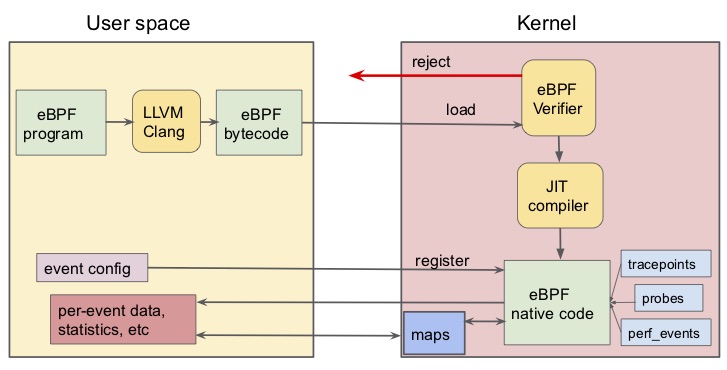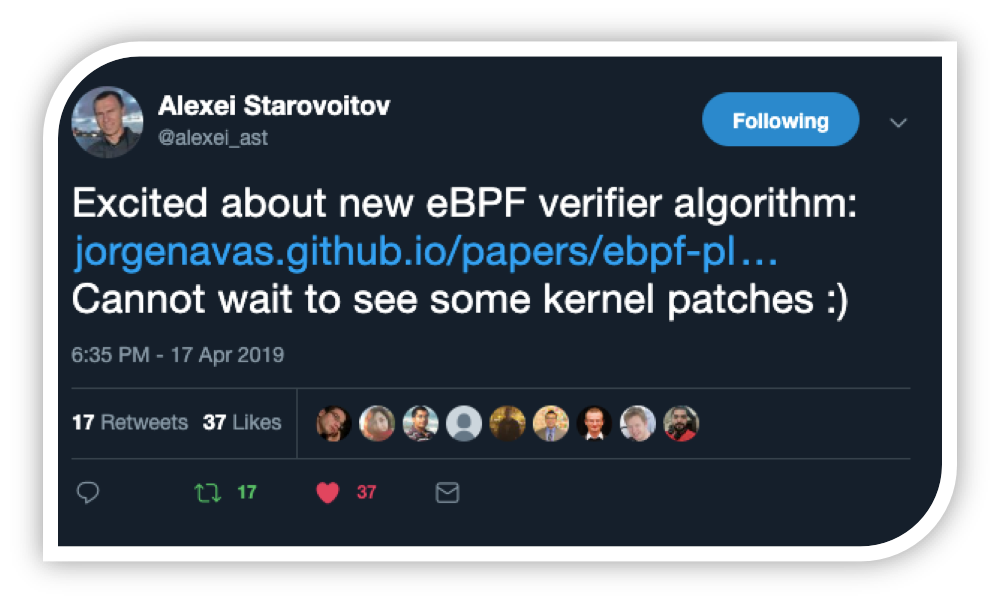We have recently presented our paper “Simple and Precise Static Analysis of Untrusted Linux Kernel Extensions” in PLDI 2019. The paper has been a joint work with our colleagues at VMware Research and Tel Aviv University. The paper is about static analysis of eBPF programs using our Crab abstract interpretation framework.
But, what are eBPF programs?
eBPF allows running user space programs inside the kernel. It was originally created to speed up the filtering of network packets. Before kernel extensions, packets needed to be copied from the kernel to the user space so that they could be filtered there. With kernel extensions, packets can be directly filtered inside the kernel avoiding unnecessary copies to the user space. Originally, it was simply called BPF (Berkeley Packet Filtering). In 2014, Alexei Starovoitov from Facebook redesigned the language (eBPF refers to extended BPF) so that very efficient executable code can be generated taking advantage of modern hardware. eBPF programs are Turing-complete and today, they have many interesting uses beyond packet filtering such as profiling, kernel debugging, security policies, etc.

This sounds great, but why are we interested in eBPF programs?
Since eBPF programs are executed in the kernel, it is mandatory to ensure that the program cannot crash, no information can be leaked from kernel to user space, and it always terminates. To do that, the Linux kernel has its own verifier to guarantee that. Yes, there is a verifier as part of the kernel. If you don’t believe me check this out.
The verifier walks eBPF programs in depth-first search while checking all paths for invalid memory accesses. Termination is trivially ensured by not allowing loops. The number of paths grows exponentially with the number of branches. Thus, if the number of paths exceeds a certain threshold the program is rejected. In summary, the verifier has several important limitations that we try to tackle in the paper:
- Too many false positives: many correct programs are rejected
- Lack of scalability: cannot handle programs with many paths
- Does not support loops
- Lack of formal foundations
All these limitations are well known by eBPF developers. As an example, we quote here Jakub Sitnicki from CloudFlare:
If you’ve spent any time using eBPF, you must have experienced first hand the dreaded eBPF verifier. It’s a merciless judge of all eBPF code that will reject any programs that it deems not worthy of running in kernel-space.
To mitigate all these problems, we propose a new solution based on abstract interpretation and develop a new memory abstract domain on the top of our Crab framework. Our evaluation with 192 programs from real-world projects such as Linux, Cilium, OpenVSwitch, and Suricata shows that we can verify the programs very fast (each one in less than 5 seconds) and with a very low false positive ratio (we proved all programs except one). Even more importantly, our verifier accepts programs with loops that were not possible to write before.
If you are interested about this topic, read our paper to learn more about how we formalize eBPF programs, how we verify them, and more about our evaluation. Our new verifier is called PREVAIL and is publicly available here.
